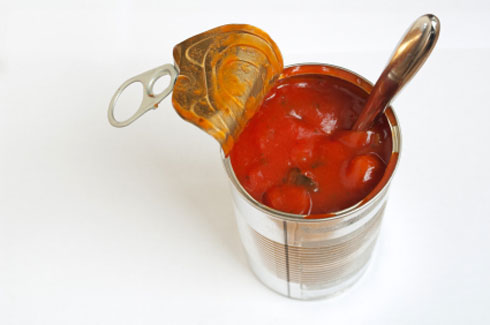Soup and the Silver Lining

Over on my personal blog, Family Bites, I’ve been running a series known as Soup Sundays. One or two Sundays a month I share a recipe for a new soup, and write about the ways I serve it to my family. I’m passionate about making soups because they’re economical, healthy, easy to make and they basically cook themselves. Despite my love for the homemade variety, I have also been known to serve my kids soup from a can, so last week when I came across an article about toxic BPA’s in canned soup, my interest was piqued.
According to a study conducted by the researchers at the Harvard School of Public Health (HSPH), people who ate canned soup each day for five days showed a more than 1200% increase in urinary bisphenol A (BPA) compared with those who consumed fresh soup daily for the same period.
Bisphenol A (BPA) is a chemical compound found in some plastics and resins. It’s used in the production of various types of food and drink containers, and as a liner in some metal cans.
Researchers in the Harvard study recruited volunteers and divided them into two groups. Group A consumed a serving of vegetarian canned soup each day for five days and Group B consumed vegetarian fresh soup daily for five days. After a two-day break, the groups reversed their assignments. “The magnitude of the rise in urinary BPA we observed after just one serving of soup was unexpected and may be of concern among individuals who regularly consume foods from cans or drink several canned beverages daily,’ said Karin Michels, who co-authored the study. ‘It may be advisable for manufacturers to consider eliminating BPA from can linings.’
The presence of BPA isn’t specific to certain brands. In a random sampling of canned products, the chemical was found in 92% of the products tested, regardless of price or organic nature of the content.
Why the concern about BPA? Last year Canada was the first country to declare BPA a toxic material, and Statistics Canada found that 91% of Canadians had the chemical in their bodies. But the debate continues to rage on’how bad is it for us?
Tony Clement, our health minister said his department had studied the effects of the chemical and found that in most instances, negative health effects only occur at levels of bisphenol A exposure much greater than normal. But he was still concerned about exposing infants to the chemical saying “We have concluded that early development is sensitive to the effects of bisphenol A. Although our science tells us that exposure levels to newborns and infants are below levels that cause effects, we believe the current safety margin needs to be higher.”
The debate continues’¦and we’ll keep waiting to hear something conclusive. In the meantime, are you watching the BPA intake in your home? Do you think you’ll be making some more homemade soups?
















